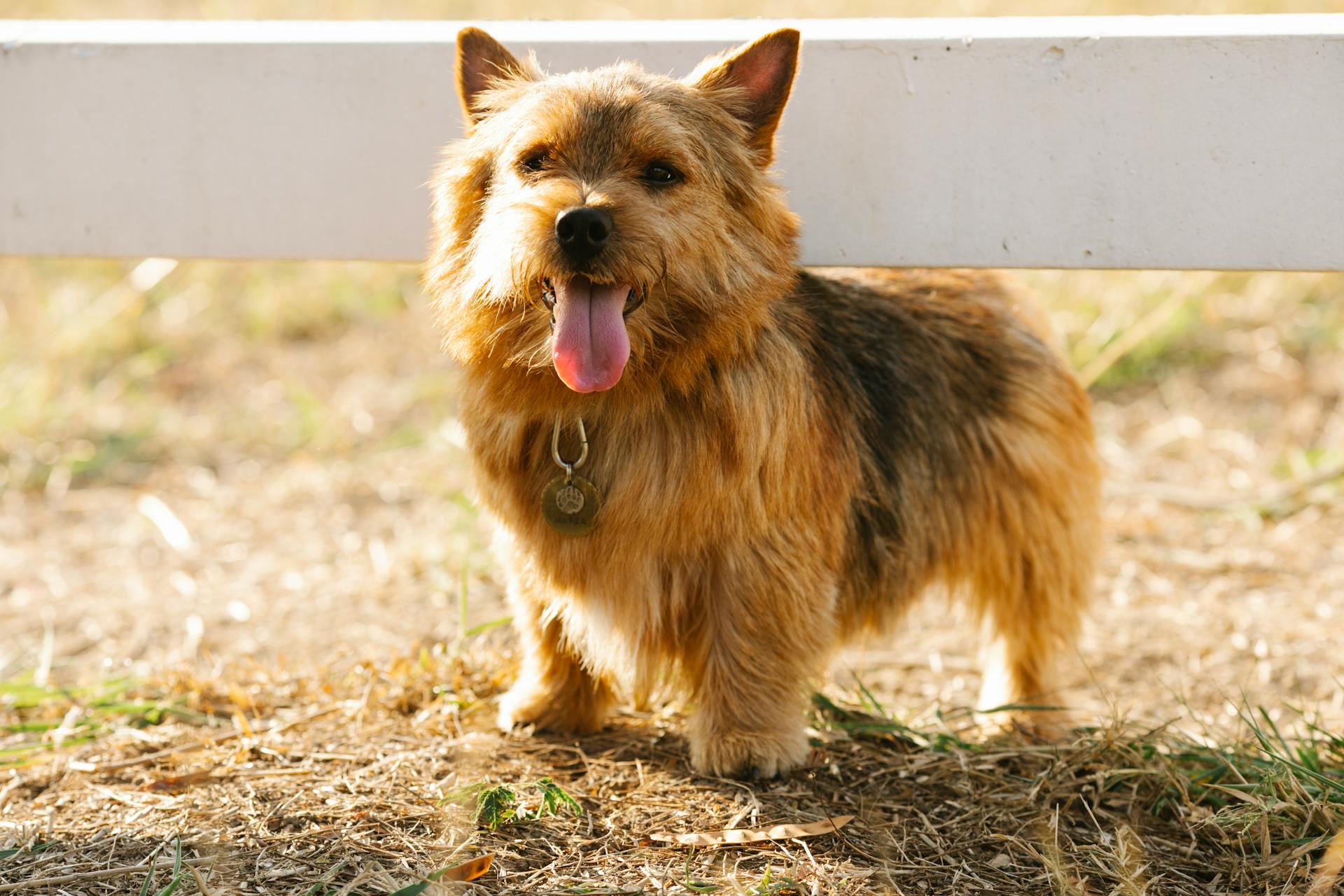
A Shih Tzu's diet is a crucial aspect of their overall health and well-being. Their small size and delicate features require a balanced and nutritious diet.
Shih Tzus should be fed 3-4 times a day until they are about six months old, as this helps prevent hypoglycemia.
Worth a look: What Can Yorkshire Terriers Eat
Puppy Feeding Basics
When feeding your Shih Tzu, it's essential to watch them, not the dish. Their body condition should determine their portion sizes, not the amount of food in their bowl.
Puppies, including Shih Tzus, start out needing many small meals a day, and four feedings per day is a common guideline. This helps prevent picky habits and ensures they're getting the nutrients they need.
To discourage picky eating, feed your Shih Tzu at regular times and in regular amounts. Don't leave food down for more than 15 minutes, as this can create bad habits.
You should choose a complete and balanced food to fulfill your Shih Tzu's nutritional requirements. This could include dry food, wet food, or a combination of both. Canned puppy food is the most expensive option, but it's also the most palatable for puppies.
You might enjoy: Mini Shih Tzu Black
Here are some common types of puppy food:
- Canned puppy food: the most expensive option, but highly palatable
- Dry puppy food (kibble): the most economical option, and can be fed as is or moistened with water or broth
- Freeze-dried, dehydrated, fresh, and raw puppy food: alternative options that may require consultation with a veterinarian
When training your Shih Tzu, you may need to adjust their food intake accordingly. Keep treats small to avoid overfeeding. And remember, it's essential to limit table scraps and people food to prevent nutritional imbalances and unwanted behaviors.
Tracking your Shih Tzu's weight and growth is crucial to ensure they're developing at a healthy rate. Weigh them weekly and compare their progress to breed-appropriate weight charts. Adjust their food intake as needed to achieve an average rate of growth.
A sudden change in your Shih Tzu's diet can cause stomach upset, so it's essential to make the switch from puppy food to adult food gradually over a few days. Consult with your veterinarian and breeder for guidance on the best food for your puppy and when to start transitioning to adult food.
A fresh viewpoint: Normal Weight for Shih Tzu
Puppy Nutrition
Puppies need a balanced diet that supports their overall health, energy levels, and coat condition.
A good starting point is to feed your Shih Tzu puppy four times a day, as most puppies finish meals quickly and don't like to leave food down for more than 15 minutes.
You can choose between dry puppy food, wet food, or a mix of both, but make sure to consult with your veterinarian and breeder to determine the best option for your puppy.
Small-breed dogs like Shih Tzus grow quickly and may reach adulthood by 9 months, so it's essential to adjust their food intake accordingly.
To track your puppy's weight and growth, weigh them weekly and record their progress, comparing them to breed-appropriate weight charts.
Here's a simple way to weigh a squirmy puppy: weigh yourself, then weigh yourself while holding the puppy, and subtract the difference to get the puppy's weight.
A balanced diet rich in high-quality protein, healthy fats, essential vitamins, and minerals is crucial for your Shih Tzu's overall health.
A good rule of thumb is to watch your puppy's body condition, not the amount of food they eat, and adjust their portion sizes accordingly.
To determine the right calorie intake for your Shih Tzu, consider their age, size, and weight, as these factors affect their metabolism rate and calorie needs.
Here's a rough guide to calorie requirements:
Remember, every dog is different, so it's essential to consult with your veterinarian to determine the best feeding schedule and calorie intake for your Shih Tzu.
Dogs' Nutritional Needs
Body condition, not the amount of food your puppy has eaten or left in the bowl, should determine your puppy's portion sizes. This means you should watch your puppy's body condition and adjust their food intake accordingly.
Puppies require different amounts of calories depending on their age, size, weight, and activity level. For example, puppies require much more calories than adult dogs, and smaller dogs require more calories than larger dogs.
A balanced diet that supports your puppy's overall health, energy levels, and coat condition is crucial. This includes a diet rich in high-quality protein, healthy fats, essential vitamins, and minerals.
Protein is essential for muscle development and maintenance in puppies. Look for dog foods where high-quality proteins like chicken, lamb, or fish are listed as primary ingredients. Adequate protein supports lean muscle mass and provides the necessary energy for their daily activities.
Puppies also require essential fatty acids, especially Omega-3 and Omega-6, which are crucial for maintaining healthy skin and a glossy coat. Foods containing sources like fish oil or flaxseed can be beneficial.
Check this out: Types of Shih Tzu Mixes
To ensure your puppy's digestive health, look for foods with easily digestible ingredients and a balance of fiber. Probiotics and prebiotics can also promote healthy gut flora, reducing the risk of digestive disturbances.
Here are some key nutritional needs for puppies:
- Protein: 20-25% for puppies, 15-20% for adult dogs
- Fat: 5-10% for puppies, 5% for adult dogs
- Fiber: adequate balance for digestive health
- Calcium, phosphorus, and potassium: essential for bone health, typically 0.5-1% of each nutrient
Remember, every puppy is different, and their nutritional needs will vary depending on their individual characteristics. Always consult with your veterinarian to determine the best diet for your puppy.
Wet vs. Dry
Shih Tzus can benefit from a diet that includes wet food, which can be more palatable and hydrating for them.
Regular hydration is essential for Shih Tzus, especially to prevent kidney and bladder stones.
Some owners opt for a mix of both wet and dry food to provide a balance of benefits.
Dry food can help maintain dental health, but it's not the only factor to consider when choosing a food for your Shih Tzu.
Incorporating wet food into their diet can help increase moisture content, which can also help prevent kidney and bladder stones.
Healthy Treats and Snacks for Them
Healthy treats and snacks are a great way to bond with your puppy, but it's essential to choose options that are safe and nutritious for them. Low-calorie treats like carrots are a good choice.
Treats should make up only a small portion of your puppy's daily caloric intake.
Carrot sticks and apple slices are healthy alternatives to traditional dog treats.
Feeding Schedule and Portion Control
Feeding your Shih Tzu the right amount of food at the right time is crucial for their health and happiness. Body condition, not the amount of food in the bowl, should determine your puppy's portion sizes.
Puppies need to eat frequently, with four feedings per day being a common guideline. This helps prevent picky habits and ensures they're getting the nutrients they need. To discourage picky eating, feed at regular times in regular amounts and don't leave food down for more than 15 minutes.
Shih Tzus are prone to obesity, so it's essential to count calories and adjust portion sizes accordingly. On average, older Shih Tzus and puppies need about 280 calories a day, adults need about 340 calories, and very active dogs need about 540 calories. You can find this information on the pet food bag or contact the supplier directly.
For your interest: All White Shih Tzu Puppies
To prevent overeating, avoid leaving large amounts of food out for your pet, especially after they reach three months of age. Instead, portion out their food to split calories into two smaller meals spaced throughout the day.
Here's a rough guide to help you determine your Shih Tzu's daily calorie needs:
Remember, these are just estimates, and your veterinarian or groomer can provide a more accurate assessment of your Shih Tzu's weight and calorie needs.
Transitioning to Adult Food
Transitioning to adult food is a gradual process that should take a few days. A sudden change in your Shih Tzu's diet can cause stomach upset and diarrhea.
Talk to your veterinarian and breeder about the best food for your puppy and when to start transitioning to adult food, based on their growth progress and breed.
You should make the switch gradually, allowing your Shih Tzu to adjust to the new food. This will help prevent digestive issues.
A few days is a good timeframe for the transition, allowing your Shih Tzu to get used to the new food without any problems.
Here's an interesting read: Shih Tzu Adult
Special Dietary Considerations
As Shih Tzus age, their dietary needs change, requiring diets lower in calories but higher in fiber and supplements like glucosamine and chondroitin for joint health.
Older Shih Tzus may also require diets with adjusted calorie intake to accommodate decreased activity levels and metabolic changes. This is especially important for preventing obesity, a weighty concern for this breed.
A diet low in certain minerals and protein, and high in moisture content, can help prevent kidney and bladder stones in Shih Tzus.
Here are some special dietary considerations for Shih Tzus:
- Pregnant or lactating dogs need more calories.
- Dogs living in colder areas require more calories.
- Healing dogs need more calories to aid in their healing.
- Dogs with kidney and bladder stones require a diet low in certain minerals and protein, and high in moisture content.
- Older Shih Tzus require diets lower in calories but higher in fiber and supplements like glucosamine and chondroitin.
Special Dietary Considerations for Seniors
As our Shih Tzus age, their dietary needs change significantly. Older Shih Tzus require diets lower in calories but higher in fiber.
Their decreased activity levels and metabolic changes mean they need a diet that's tailored to their new lifestyle. This may involve switching to a senior-specific food formula.
Glucosamine and chondroitin supplements can be beneficial for joint health in older Shih Tzus. These supplements can help reduce joint pain and inflammation.
Regular hydration is also crucial for senior Shih Tzus. This can be achieved by incorporating more moisture-rich foods, such as wet food, into their diet.
Digestive Health
Shih Tzus may have sensitive digestive systems, requiring easily digestible food with the right balance of fiber. This can help reduce the risk of digestive disturbances.
Foods with the right balance of fiber are essential for maintaining a healthy digestive system in Shih Tzus. Probiotics and prebiotics can also promote healthy gut flora.
A gradual transition to new food is necessary to avoid digestive upset. This can be achieved by mixing a small amount of the new food with the old, gradually increasing the new food while decreasing the old.
Raw and Homemade Diets
If you're considering a raw diet for your Shih Tzu, you can either create homemade raw meals or opt for pre-prepared raw dog food from a reputable supplier.
Choosing a reputable supplier can make raw feeding much simpler, as you can stock your freezer with quality meals at the click of a button. Pre-prepared raw dog food from suppliers like ProDog Raw's Complete raw dog food or raw puppy food formula ranges are FEDIAF* approved, ensuring nutritional balance.
Intriguing read: Pug Dog Feeding Chart
*FEDIAF is the agency that sets nutritional standards for pet food across Europe.
Homemade diets can be a healthy option, but they require careful planning to ensure they meet all nutritional needs. Consult with a veterinarian or a canine nutritionist before opting for a homemade diet to ensure it's balanced and suitable for your Shih Tzu.
Raw Feeding Guide
Formulating meals with the right ratios of ingredients is essential for your dog's optimal nutrition.
Making your own raw food meals can be complicated, especially if you're new to raw feeding.
Choosing a reputable supplier of pre-prepared raw dog food can make things much simpler.
FEDIAF-approved recipes, such as ProDog's Complete raw dog food, ensure your dog receives nutritionally balanced meals daily.
You can stock your freezer with quality raw food meals at the click of a button by selecting a reputable supplier.
FEDIAF is the agency that sets nutritional standards for pet food across Europe.
Whether you choose pre-prepared raw food or create your own DIY recipes, a natural species-appropriate diet will fuel your dog's well-being.
We'll help you work out how much to feed your dog, so you can be confident in their nutrition.
Suggestion: Shih Tzu Dog Information
DIY Dog Diets: Good Option?
If you're considering a homemade diet for your Shih Tzu, it's essential to consult with a veterinarian or a canine nutritionist to ensure it's balanced and suitable for your dog.
A homemade diet can be a healthy option, but it requires careful planning to meet all nutritional needs.
To transition to a homemade diet, start by mixing a small amount of the new food with the old, gradually increasing the new food while decreasing the old.
This gradual transition can help avoid digestive upset, which is especially important for sensitive Shih Tzus.
Frequently Asked Questions
What dog food is best for Shih Tzu?
For Shih Tzus, Nutro Ultra Small Breed and Merrick Lil' Plates Wet Food are top-rated options that cater to their specific nutritional needs, but it's essential to consult with a veterinarian to determine the best fit for your furry friend.
What times should a Shih Tzu eat?
Feed your adult Shih Tzu 3 times a day, with a reduced nighttime gap between meals, and consider adding a morning snack. Puppies may require 4-10 daily meals depending on their age and individual needs.
How much should a Shih Tzu eat daily?
A 15-pound adult Shih Tzu needs around 525 calories per day. Consult the dog food label to determine the correct serving size for your pet.
How many cups to feed a Shih Tzu puppy?
For Shih Tzu puppies, a general guideline is to feed 1/4 to 1/2 cup of food per 10 pounds of body weight per day, but consult with your veterinarian for a tailored feeding plan
Why is my Shih Tzu so hungry all the time?
Shih Tzus have a high metabolism and burn energy quickly, leading to an insatiable appetite. This is especially true for puppies, who need to refuel frequently to support their growth and active nature.
Sources
- https://www.akc.org/expert-advice/health/puppy-feeding-fundamentals/
- https://www.pedigree.com.ph/feeding/feeding-guidelines
- https://www.wikihow.com/Feed-Your-Shih-Tzu
- https://iheartdogs.com/ideal-diet-for-shih-tzu-the-ultimate-shih-tzu-feeding-guide/
- https://www.prodograw.com/raw-feeding-guide/shih-poo-feeding-guide/
Featured Images: pexels.com


